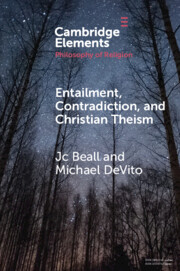Element contents
Entailment, Contradiction, and Christian Theism
Published online by Cambridge University Press: 14 March 2023
Summary
- Type
- Element
- Information
- Online ISBN: 9781108995788Publisher: Cambridge University PressPrint publication: 30 March 2023
References
- 3
- Cited by

